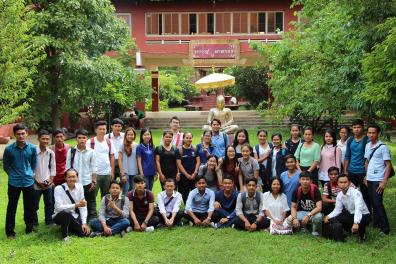International partnerships: Manusastra

Officially launched in November 2014, supported by Inalco and IRD (Institut de Recherche pour le Développement) via their "Structure et Dynamique des Langues" (SeDyL) joint research unit, Manusastra is a groundbreaking international cooperation program aimed at developing training and research in the humanities - archaeology, history, art history, ethnology - and linguistics, in Cambodia, Laos and all the countries of Southeast Asia. It also aims to foster the emergence of a new generation of researchers in the region in partnership, notably, with the Centre Asie du Sud-Est (CASE, INALCO), CNRS, École française d'Extrême-Orient (EFEO), Agence universitaire de la Francophonie (AUF), Université Royale des Beaux Arts (URBA, Phnom Penh).
A training component
The Training component offers students two degree courses: a Franco-Cambodian Bachelor's degree and a Master's degree.
The Bachelor's degree is itself divided into two diplomas awarded by Inalco:
- "Languages, Literatures and Civilizations of Southeast Asia";
- "Diplôme de Préparation à la Recherche en Sciences humaines" (institutional diploma).
To obtain the Licence franco-cambodgienne, students must, throughout their course of study, follow intensive training in "Français Langue Étrangère" (FLE) on the one hand and, on the other, courses at the Université des Moussons.
At Master's level, the Manusastra program offers students the study of subjects that were previously virtually non-existent in Cambodia. By combining language and human sciences, the aim is to train high-level French-speaking specialists in history, ethnology and linguistics. Theoretical teaching is complemented by several field visits supervised by French-speaking researchers recognized in their respective fields. Between August 13 and 19, 2017, a Summer University was held in Phnom Penh. Students took part in the "Culture, Valorization and Conservation" program initiated by URBA to promote Cambodian language and culture as well as cultural diversity in Southeast Asia.
A research component
Starting in 2014, a four-year international multidisciplinary research project was set up: "Investigating forms of collective memory in the Khmer space and Southeast Asia". Initially funded by the World Bank via the Ministry of Education, Youth and Sports of the Royal Government of Cambodia, it was then taken over - between the end of 2014 and the end of 2017 - by the City of Paris' "Emergences" program.
A first international symposium entitled CAṂṆĀṂ, "La conscience du passé chez les Khmers et leurs voisins. Approche linguistique, historique et ethnologique", took place from December 15 to 17, 2014 in Phnom Penh. A second colloquium was hosted by Inalco in December 2017.
The initial results of this reflection on Khmer collective memory in the long term have been published in a collective book entitled Le passé des Khmers: langues, textes, rites (éditions Peter Lang) and co-edited by Nasir Abdoul-Carime, Grégory Mikaelian and Joseph Thach.
Thus, by reinforcing the Bachelor's degree level, creating a Master's degree course and setting up a regional research team, Manusastra is working to establish a research culture that will contribute to the development of university teaching and the training of resource persons capable of thinking about the issues linked to the development of these countries. To provide answers to these issues in line with the reform strategies developed by the Cambodian government, Inalco and IRD developed a new structuring project in 2016 through SeDyL: Governance and Emergence of Research in the Humanities in Cambodia (GEReSH-CAM) as a complement to Manusastra. Coordinated by Inalco, GEReSH-CAM is co-financed by the European Union via the Erasmus + KA2 "Capacity Building" program. It brings together ten partners: Inalco, IRD, AUF, the University of Latvia, the University of Educational Sciences of Lithuania, the Ministry of Education, Youth and Sports of Cambodia, the Ministry of Culture and Fine Arts of Cambodia, the Royal University of Fine Arts of Cambodia, the Royal University of Phnom Penh and the National Institute of Education of Cambodia. The outcome of this three-year project is the establishment of an inter-university research center in the humanities in Cambodia under the supervision of the three Cambodian higher education institutions partnering in the project.
Scientific contact:
Laboratoire Sedyl
site Manusastra